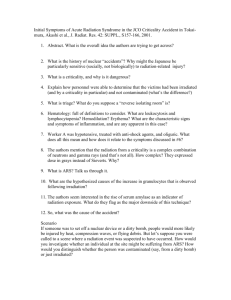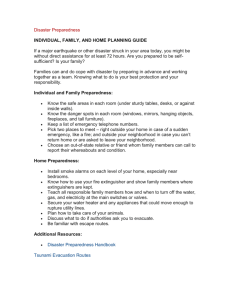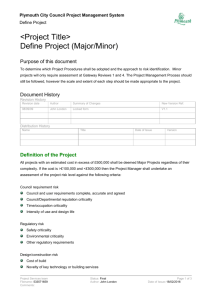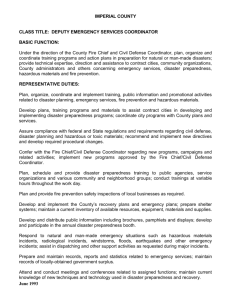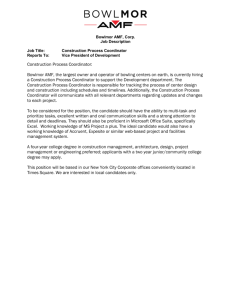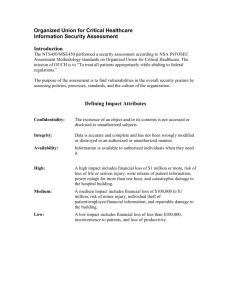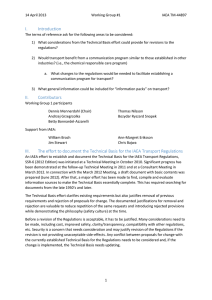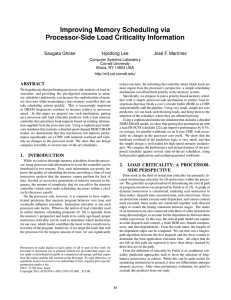Emergency Management Program Coordinator
advertisement
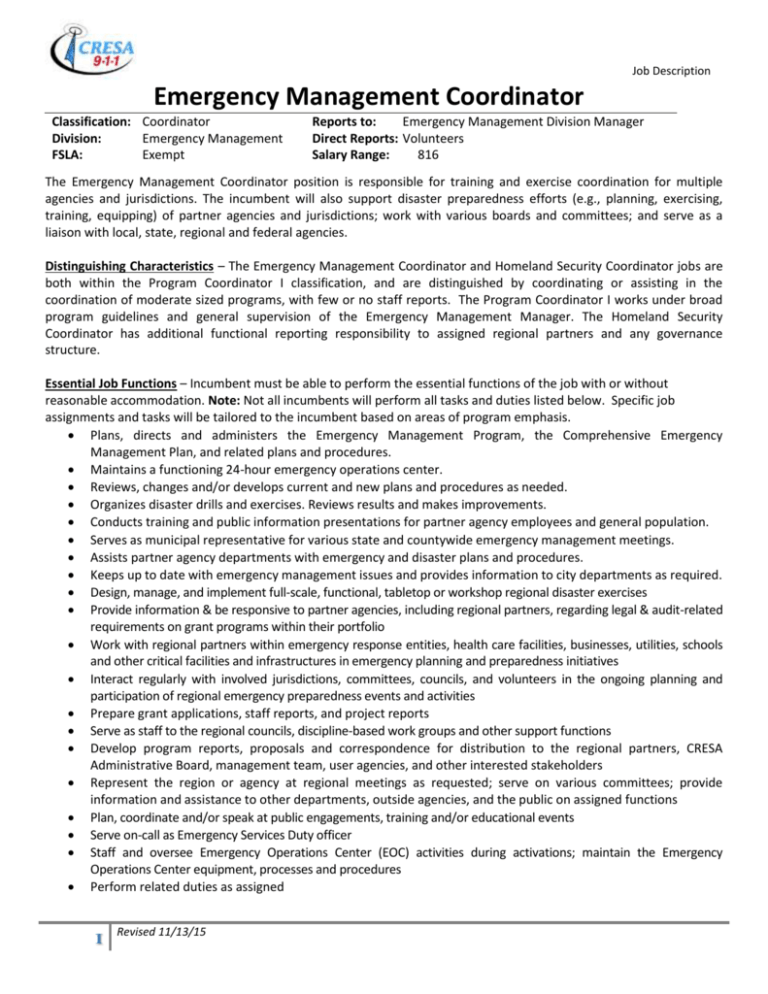
Job Description Emergency Management Coordinator Classification: Coordinator Division: Emergency Management FSLA: Exempt Reports to: Emergency Management Division Manager Direct Reports: Volunteers Salary Range: 816 The Emergency Management Coordinator position is responsible for training and exercise coordination for multiple agencies and jurisdictions. The incumbent will also support disaster preparedness efforts (e.g., planning, exercising, training, equipping) of partner agencies and jurisdictions; work with various boards and committees; and serve as a liaison with local, state, regional and federal agencies. Distinguishing Characteristics – The Emergency Management Coordinator and Homeland Security Coordinator jobs are both within the Program Coordinator I classification, and are distinguished by coordinating or assisting in the coordination of moderate sized programs, with few or no staff reports. The Program Coordinator I works under broad program guidelines and general supervision of the Emergency Management Manager. The Homeland Security Coordinator has additional functional reporting responsibility to assigned regional partners and any governance structure. Essential Job Functions – Incumbent must be able to perform the essential functions of the job with or without reasonable accommodation. Note: Not all incumbents will perform all tasks and duties listed below. Specific job assignments and tasks will be tailored to the incumbent based on areas of program emphasis. Plans, directs and administers the Emergency Management Program, the Comprehensive Emergency Management Plan, and related plans and procedures. Maintains a functioning 24-hour emergency operations center. Reviews, changes and/or develops current and new plans and procedures as needed. Organizes disaster drills and exercises. Reviews results and makes improvements. Conducts training and public information presentations for partner agency employees and general population. Serves as municipal representative for various state and countywide emergency management meetings. Assists partner agency departments with emergency and disaster plans and procedures. Keeps up to date with emergency management issues and provides information to city departments as required. Design, manage, and implement full-scale, functional, tabletop or workshop regional disaster exercises Provide information & be responsive to partner agencies, including regional partners, regarding legal & audit-related requirements on grant programs within their portfolio Work with regional partners within emergency response entities, health care facilities, businesses, utilities, schools and other critical facilities and infrastructures in emergency planning and preparedness initiatives Interact regularly with involved jurisdictions, committees, councils, and volunteers in the ongoing planning and participation of regional emergency preparedness events and activities Prepare grant applications, staff reports, and project reports Serve as staff to the regional councils, discipline-based work groups and other support functions Develop program reports, proposals and correspondence for distribution to the regional partners, CRESA Administrative Board, management team, user agencies, and other interested stakeholders Represent the region or agency at regional meetings as requested; serve on various committees; provide information and assistance to other departments, outside agencies, and the public on assigned functions Plan, coordinate and/or speak at public engagements, training and/or educational events Serve on-call as Emergency Services Duty officer Staff and oversee Emergency Operations Center (EOC) activities during activations; maintain the Emergency Operations Center equipment, processes and procedures Perform related duties as assigned 1 Revised 11/13/15 Job Description Minimum Job Qualifications –Any equivalent combination of education and experience that provides the applicant with the knowledge, skills and ability required to successfully perform the job will be considered. At least one year of emergency preparedness experience related to the assignment area. Bachelor’s degree in emergency management, business administration, public administration, or a closely related field may substitute for the required experience. Knowledge of the laws and regulations governing emergency management. Knowledge of emergency and/or disaster planning principles and practices. Knowledge of departmental policies and procedures. Skill in managing and coordinating disaster recovery operations. Excellent communication skill both verbal and written. Skill in the use of a computer and related software. Ability to establish and maintain effective working relationships. Ability to analyze information under emergency operating conditions and directing the course of action to be taken. Knowledge of: Principles and practices of regional coordination and exercise facilitation. Principles and practices of supervising, training, motivating and leading regional partners. Principles and practices of project management and grant administration. Modern administrative methods and procedures, business correspondence and report preparation. Application and interpretation of Agency policies and procedures as well as local, state and federal laws and regulations relevant to the program area. Effective research and record keeping methods and techniques. Ability to: Organize and coordinate a comprehensive regional exercise program. Interpret & understand the tenets of the Homeland Security Exercise & Evaluation Program (HSEEP) in addition to applicable laws, regulations, policies and procedures. Respond, resolve and coordinate resolution of difficult and sensitive concerns about the program and/or resources needed to accomplish the goals. Apply critical thinking, problem solving and collaborative approaches to improving program services. Effectively plan and accomplish program goals, including appropriate delegation of tasks to volunteers, interns, temporary employees and/or other stakeholders. Carry out regional and agency policy directives in an effective and timely manner. Analyze situations thoroughly, identify potential problems, and find effective solutions. Establish and maintain positive and professional working relationships with managers, coworkers, other governmental jurisdictions, volunteers, the media and the public. Effectively communicate and express ideas both orally and in writing. Apply appropriate independent initiative, discretion, judgment and organizational skills to a variety of projects, assignments and situations. Understand and execute complex oral and written instructions. Apply available guidelines, policies or procedures in diverse situations. Prepare and present written correspondence, reports and materials in clear, correct and comprehensible terms from general notes and concepts. Necessary Special Requirements: Must be able to adjust work hours as necessary and be available for call-out in event of emergencies. Must maintain 24-hour availability via an agency supplied wireless device capable of voice and data communication when assigned as Duty Officer. Must possess a valid driver license and have access to a motor vehicle (personal or agency) on an as needed daily basis. Physical / Sensory Requirements. The following characteristics describe the most common ways this position’s essential functions and job tasks are performed. Any incumbent or candidate for this position must be able to perform the essential functions and job tasks with or without reasonable accommodation. Sight and Vision Close / Fine Visual Acuity. Differentiate and comprehend visual effects of subtlety or precision. General Visual Acuity. Differentiate and comprehend visual effects of general size, shape, and distance. Hearing General / Broad Hearing. Differentiate and comprehend: o Voices (ambient or intrusive) face-to-face, in groups with multiple speakers, by phone or radio, etc. pitch, volume in ‘normal range’ 2 Revised 11/13/15 Frequency Daily Criticality Important Frequency Criticality Daily Very Important Job Description o Verbal speech, language, accents, and sounds including subtle speech, intonation, inflection, emphasis, and nuance. Speech Frequency Communication. Communicate fluently in English. Communicate orally; express thoughts and Daily emotions by word, sound, and gesture. Touch Frequency Basic Repetitive Hand / Arm Motion. Make regular movement (motion) of wrist, hand, fingers, Daily elbow, shoulder, etc. to type, use computer mouse, etc. Lift. Move object upward to a higher position; hoist. Typical weight lifted does not exceed 10 lbs. Physical Coordination Frequency Weekly / Monthly Mobility. Move about to accomplish work. Weekly / Monthly Drive. Operate a motor vehicle to get self to and from various locations. Working Memory Frequency Audio Memory. Retain and retrieve information gained via audio sources. Daily Visual Memory. Retain and retrieve information gained via visual sources. Comprehension Frequency Rapid Comprehension & Application. Grasp meaning, nature, or importance of information. Daily Quickly apply knowledge to work or situation. Complex Comprehension & Application. Grasp meaning, nature, and importance of complex or Daily ambiguous information and apply to work Environmental Working Conditions Frequency No Substantial Hazards. Position is not substantially exposed to adverse environmental -conditions. Level of Physical Activity Frequency Sedentary Work. Work primarily requires exerting up to 10 lbs. of force occasionally and/or a Daily negligible amount of force frequently or constantly to lift, carry, push, pull or otherwise move objects, including the human body. Sedentary work involves sitting most of the time. 3 Revised 11/13/15 Criticality Very Important Criticality Important Slightly Important Criticality Important Important Criticality Very Important Very Important Criticality Very Important Very Important Criticality -Criticality --

